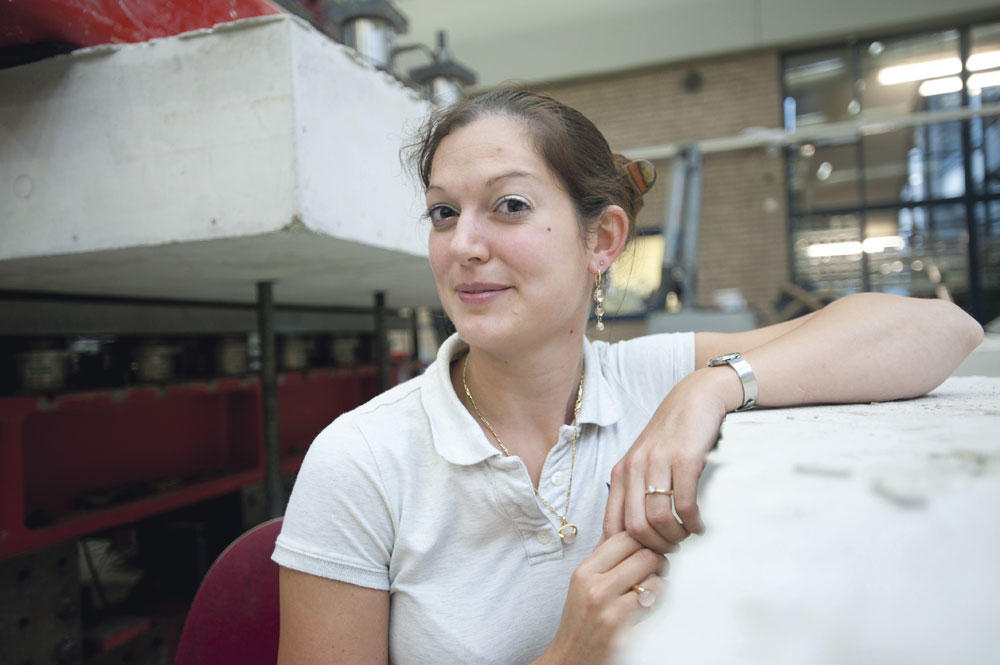In 127 tests, I’ve looked at how cracks and failures occur. In the laboratory, I’ve put loads on 5 x 2.5 meter slabs, 30 centimetres thick, until they collapsed. It’s very spectacular to do the tests, because all the materials I use are so big.
The testing is part of my research on how forces flow in concrete slabs that are used in bridges. I especially focus on loads close to the supports. In the Netherlands, many slab bridges were constructed in the 1970s, when many highways were built. However, it’s not yet known how the slabs behave. But due to the increased traffic volumes and the European Union’s new concrete design codes, it is necessary to know the behaviour of bridges. Together with colleagues in my group, we conduct research to fill in (some of) the gaps. We try to get to know what the real capacity of the bridges is.
The concrete slabs I use during the tests are scale models; they are half as big as the ones that are used in bridges. I love to do the tests. When I first started, I feared that doing a PhD would be a bit boring, but it hasn’t been thus far. No test is the same: every time something different occurs. I use a crack width comparator, which is the size of a business card, to measure the crack widths. I then record the test results in a lab book. I will analyse my test results over the course of the next two years. I’m excited to see the results.
Since last year I’ve been writing a blog about my research and life in the laboratory. I started it because I wanted to show others what’s going on in my life as a PhD student. And when I look back in a couple of years and read my blog, I will know exactly what I did. The blog is sort of like the lab book I also keep during the testing.
In my blogs, for instance, I write about how to handle large amounts of literature and how to write an abstract in 30 minutes. To be a PhD student is to learn many new things. As an engineer, one is always prepared for all challenges. I have therefore taken extra courses and write about things I come across and what I’ve learned.”
phdtalk.blogspot.com
Het valt niet mee om na een zonnige zomervakantie weer in het werkritme te komen. Mijn vastberadenheid om me vanaf nu niet meer zo druk te maken is na een paar uur achter de pc alweer grotendeels verdwenen. Moedeloos blader ik door de lange lijst e-mails in mijn inbox. Het voordeel van buiten het hoogseizoen op vakantie gaan is dat je de topdrukte op de vakantiebestemming ontloopt; het nadeel is dat die topdrukte zich bij thuiskomst naar je inbox heeft verplaatst. Nou is met die werkdruk op zich niet eens zoveel mis. Wat het vervelend maakt, is het onbehaaglijke gevoel dat het allemaal drukte is om niets. Vlak voor de vakantie leek het allemaal nog zo belangrijk: het congrespaper, de vakpublicatie, de evaluatie van het voorstel. Nu lijkt het meer op een ingewikkelde vorm van bezigheidstherapie.
Het reïntegratieproces wordt niet bevorderd door de herinnering aan Willemijn Dicke’s universiteitsroman ‘Mea’. Op het strand kon ik er nog hartelijk om lachen, maar nu ik vanaf mijn werkplek om me heen kijk, is het beeld dat Dicke van de universiteit schetst, hoe cynisch en negatief ook, beangstigend herkenbaar. ‘Mea’ is zo’n boek waarin de dagelijkse realiteit van het universitaire leven wordt uitvergroot, een satire van de academie. De academicus vindt bevestiging in de alledaagse worstelingen van de hoofdpersoon: de monotonie van het congressencircus. Hoogleraren die het drukker hebben met gemene politieke spelletjes dan met onderzoek. Onderzoekers die zich al hun hele loopbaan bezighouden met betekenisloos onderzoek, die zich redden met blufpoker.
Die schets sluit aan bij een lange traditie van kritische campusromans als ‘Small World’ van David Lodge, ‘Onder professoren’ van W.F. Hermans en het hilarische ‘Lab’ van Miquel Bulnes. Al in 1908 schreef F.M. Cornford in zijn ‘Microcosmographia Academica’: ‘The noise of vulgar fame should never trouble the cloistered calm of academic experience. Hence learning is called sound when no one has ever heard of it; and ‘sound scholar’ is a term of praise applied to one another by learned men who have no reputation outside the university, and a rather queer one inside it. If you should write a book (you had better not), be sure that it is unreadable; otherwise you will be called ‘brilliant’ and forfeit all respect.’
De vraag is nu: als alle academici zich zo goed in die beelden herkennen, waarom zijn we dan niet bij machte om er iets aan te doen? Waarom wordt de universiteit geregeerd door zuurpruimen die meer om hun baan geven dan om waarheidsvinding? Waarom maken de bureaucraten de dienst uit en delven de bevlogen vakgekken het onderspit? Hoe kan een plek die gericht is op het verwerven van nieuwe kennis politiek zo conservatief zijn?
Hoogste tijd voor actie. Op zoek naar inspiratie blader ik nog eens door de digitale vakantiefoto’s. Ik probeer de ontspanning weer te voelen, de drang tot vernieuwing, tot verzet tegen de gevestigde orde. Dit jaar wordt het allemaal anders, vanaf nu gaat het roer om. Voor kleingeestige politiek is niet langer plaats in deze tempel van de waarheidsvinding. Voetsoldaten van de vooruitgang, ontwaakt!
Maar nu eerst een kopje koffie.
Daan Schuurbiers reflecteert het komende jaar op het universitaire leven vanaf zijn werkplek aan de Universiteit Utrecht.



Comments are closed.